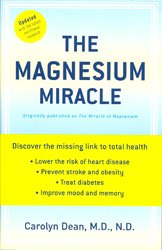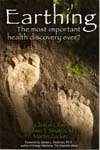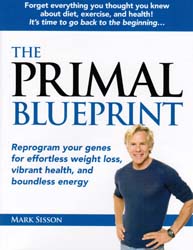In our fast paced society, individuals are constantly scrambling to complete a medley of tasks before tucking into bed for the night, and sleep has somehow fallen to the bottom of our perceived hierarchy of needs. We are driven to stay up late staring deep into a glaring blue computer screen on a quest for the answers to our life questions, jolt awake to a vicious alarm for last minute food preparations or an ambitious trip to the gym, yet in turn find ourselves schlepping to work with large bags under our eyes sipping on a caffeinated beverage that we truly didn’t want to buy. We repeatedly manage to harshly disconnect ourselves from the beautifully intricate circadian mechanisms of nature, and then, when we try to return to a pattern of restorative sleep, we are simply unable to. What's worse, we go on adding a slew of addictive, toxic substances and convoluted rituals to help us get some sleep, and still we lie awake, panicked with self-negative thinking, "there must be something wrong with me!"

5 Natural Ways to Find Restful Sleep
Take a relaxed breath, let go and realize you are not alone. Perhaps it is time to look at simple, natural ways to return to the delicate sleep/wake balance we were meant to enjoy. While getting restful sleep may be one of the most difficult tasks of wellness, it is in many ways, the most primal. This article presents five natural ways to get more restful sleep, which may just be the missing link to your radiant wellness.
1. Ground with Earthing Sheets

If we review primal human history, our ancestors were consistently in direct contact with the earth, especially during periods of rest. By getting their bodies in touch with the earth, people were reaping the benefits of the constant flow of direct current that the ground and bodies of water store from the sun’s vibrant energy- - a process we now call earthing. The flow of electrons that the earth releases has a great anti-inflammatory capacity, able to bring the human body into a harmonious balance to help relieve pain, alleviate stress, accelerate recovery from injury and boost immune response. In our fragmented modern world, we are deeply disconnected from nature's rhythm and energy- thwarted by shoes, buildings, cars- and often struggle with insomnia as a result. This is not to say you should drop everything and curl up in the middle of the backyard tonight (much to the curiosity of your neighbors), but you can experience the full spectrum of the earth’s nurturing energy for 8 hours at night using an earthing sheet. These sheets easily plug into the grounding port of your home's electrical outlet for an effortless way to tap into earthing benefits and improve your sleep patterns. Don't forget that during the day, simply trying to get outside barefoot for as little as 20 minutes can be beneficial to your health as well.
2. Restore Melatonin
 Melatonin is the “master hormone” secreted by the pineal gland to prepare the body for sleep. Release of melatonin is triggered by darkness, and consequently subsides in the morning to allow for invigorating wakefulness. Many people today are chronically melatonin depleted due to prolonged disruption of their circadian rhythms from jet-lag, working the night shift, socializing late at night, addictive on-line shopping habits, and harsh artificial lighting. Melatonin levels also suffer from exposure to the harmful EMFs (electro magnetic fields) of devices such as cellphones, TVs, cars, computers etc. Taking 1-3 mg of melatonin about one hour before sleep has been shown in clinical studies to combat even severe cases of insomnia. Melatonin also has several other healing implications, in its bioregulatory properties as a powerful antioxidant, anti-aging coordinator and sexual hormone facilitator.
Melatonin is the “master hormone” secreted by the pineal gland to prepare the body for sleep. Release of melatonin is triggered by darkness, and consequently subsides in the morning to allow for invigorating wakefulness. Many people today are chronically melatonin depleted due to prolonged disruption of their circadian rhythms from jet-lag, working the night shift, socializing late at night, addictive on-line shopping habits, and harsh artificial lighting. Melatonin levels also suffer from exposure to the harmful EMFs (electro magnetic fields) of devices such as cellphones, TVs, cars, computers etc. Taking 1-3 mg of melatonin about one hour before sleep has been shown in clinical studies to combat even severe cases of insomnia. Melatonin also has several other healing implications, in its bioregulatory properties as a powerful antioxidant, anti-aging coordinator and sexual hormone facilitator.
3. Avoid Carbohydrates...especially before bed
 As many well know, carbohydrate consumption causes a stimulating spike in levels of blood glucose leading to disruptive surges in insulin production. Eating a high carbohydrate snack before bed (such as the go-to gooey cookie and glass of milk) creates oscillations in cellular load that can result in restlessness, disrupted sleep, and even night-time waking as your body tries to process the energy it has been given. Many studies note that ceasing to eat at least 3 hours before bed is a helpful approach in eliminating sugar fluctuations and potential digestive complications during the night (think about the ill effects of gravity on a full stomach). In general, it is important to avoid foods that have been highly processed as well, as these wreck havoc on the digestive tract and prevent the much needed full-system rest. Having a light snack like a handful of sprouted raw nuts (full of magnesium and beneficial nutrients) with a soothing herbal tea, such as chamomile, will serve best.
As many well know, carbohydrate consumption causes a stimulating spike in levels of blood glucose leading to disruptive surges in insulin production. Eating a high carbohydrate snack before bed (such as the go-to gooey cookie and glass of milk) creates oscillations in cellular load that can result in restlessness, disrupted sleep, and even night-time waking as your body tries to process the energy it has been given. Many studies note that ceasing to eat at least 3 hours before bed is a helpful approach in eliminating sugar fluctuations and potential digestive complications during the night (think about the ill effects of gravity on a full stomach). In general, it is important to avoid foods that have been highly processed as well, as these wreck havoc on the digestive tract and prevent the much needed full-system rest. Having a light snack like a handful of sprouted raw nuts (full of magnesium and beneficial nutrients) with a soothing herbal tea, such as chamomile, will serve best.
4. Exercise Appropriately: Cellercising
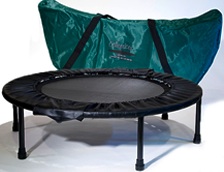
Fitness is key to optimizing health, living an energetic life and sleeping well. However in our competitive and high intensity society, we are often ravaged by inappropriately strenuous exercise regimens that we must squeeze in at odd hours of the day. Yet no matter how many miles we try to fit into our after dinner jogs to help tucker ourselves out, the body needs time to unwind before settling into sleep. Experts recommend completing exercise at least 3 hours before bed time to allow the body temperature (which has risen during activity) to settle to the cooler temperatures that are associated with sleep cycling. Additionally, forms of high-impact exercise can be detrimental to sleep as well due to frequent injury. The pain and discomfort associated with strains and sprains, leave us tossing and turning in the night in attempts to find an amiable position. Instead, limit rigorous exercise to certain periods of the week (like slow weight lifting, or sprinting) and choose an activity you enjoy for more frequent exercise like walking, hiking, or leisurely biking. If you haven't already tried it, consider cellercising (also called rebounding) for fun, gentle, effective exercise that revitalizes the body on a cellular level, promoting heart health, detoxifying lymph circulation and increasing muscular strength. Learn more by reading our post, Rebounder Benefits: What rebounding can do for you.
5. Replenish Magnesium
 Magnesium is an important mineral, which is essential in the functioning of over 300 enzymes in the body. It helps to facilitate vital energy production and storage, but also aids in muscle relaxation. It is currently estimated that about two thirds of the population in the United States (about 200 million individuals) are magnesium deficient, leading to a variety of complications that thwart sleep such as restless legs, inefficient insulin metabolism, spasms, stress, anxiety and panic attacks. Unlock the benefits of transdermal magnesium therapy using Ancient Minerals oil spray, gel, lotion or bath flakes for a soothing re-mineralization for your deprived system. For more information check out our post, Ancient Minerals: Are you Magnesium Deficient?
Magnesium is an important mineral, which is essential in the functioning of over 300 enzymes in the body. It helps to facilitate vital energy production and storage, but also aids in muscle relaxation. It is currently estimated that about two thirds of the population in the United States (about 200 million individuals) are magnesium deficient, leading to a variety of complications that thwart sleep such as restless legs, inefficient insulin metabolism, spasms, stress, anxiety and panic attacks. Unlock the benefits of transdermal magnesium therapy using Ancient Minerals oil spray, gel, lotion or bath flakes for a soothing re-mineralization for your deprived system. For more information check out our post, Ancient Minerals: Are you Magnesium Deficient?
If you want to learn more about these sleep topics, see the sources for this article below, which includes the phenomenal resource Sleep, Interrupted. This book by Steven Y. Park M.D. goes through other useful techniques to help with sleep and common reasons for insomnia. He also explains the epidemic of sleep apnea- another condition that is detrimental effects on sleep and generally health- but that's for another blog post! Until then, read up! But be careful...some studies say that it is important to select your night reading with care as non-fiction can be too overstimulating for winding down!
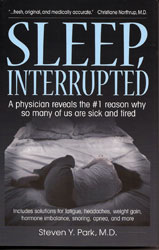
Photo: Chamomile Tea by annz stream/courtesy of flickr

